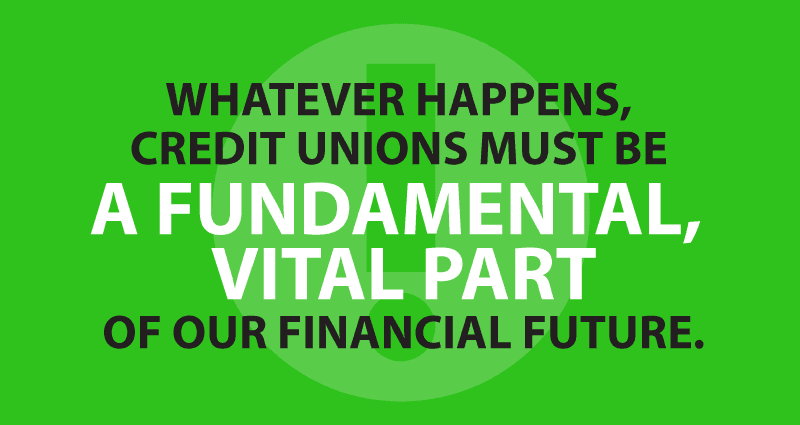
Eating the Elephant: Economic Upheavals
There’s a silly old joke that goes something like this: “How do you eat an elephant? One bite at a time.” In this series, we’re talking about taking a bite out of some of the “elephants in the room” – big, obvious, uncomfortable problems that everyone’s trying to ignore. We’re hoping to inspire credit union people to help their members take take on their economic elephants, even if the conversation is a little awkward.
This week’s pachyderm is more of a herd: economic upheavals. We’re using this title to lump together several fundamental changes to our world that are coming sooner than you might think. We’ll illustrate with a couple of examples:
The decline of fossil fuels
In a nutshell, this is a great thing for humanity (cleaner air, and less CO2 in the atmosphere), but the shift to renewable energy (mostly solar) will cause massive upheavals in many different industries over the next generation. And the disruption has already started — the cost for solar energy has plummeted faster than anyone predicted.
This Ars Technica article is a nice overview of the state of solar — the cost for rooftop solar power is now lower than electricity from the grid. And large-scale solar installations produce electricity far cheaper than that. There are significant obstacles, of course, and we’re a long way and many years from shuttering the last coal mine. But the change is real, and it’s well underway. Large companies (Exxon, BP, Shell) and even entire countries (China, Saudi Arabia, Cuba) are putting serious effort and serious money into a pivot away from fossil fuels to renewables.
How will this affect your members? As in all disruptions, there are winners and losers. The rise of the internet has decimated industries like newspapers and travel agents, but has also enabled entire new industries to rise. Credit unions will need to adapt along with their members, both to help their members handle the negative effects of disruption (for example, petroleum engineers who need to retrain) and take the best advantage of the positive effects (loans for solar panels and storage).
The rise of sharing and the gig economy
Uber, Lyft, Airbnb, and Zipcar are just the beginning. Your members are rapidly becoming more and more comfortable with the idea of transportation, housing, and even work as a shared, ad-hoc service. How are you adapting to young professionals who don’t even want to own a car? Can you figure out a way to make a car loan make sense to a busy Lyft driver, or do you just say “no”? Can your underwriting handle issuing a high-limit Visa to an elite programmer with no fixed address who only works three months a year and travels the other nine? Will you say “no” to the AirBnB host who wants to add a room to her home, or will you come up with some hybrid of a home equity/business loan?
These aren’t urban fads or the distant future; these are real people who have real and unmet financial needs right now. The fundamental “life cycle” of your average member is changing drastically and is far less predictable. The question is not “should we adapt”, it’s “how do we adapt” or better yet “how do we lead the way?” The next generation of members will require far more than the basic checking, credit card, car loan combo platter that’s served CUs for so long.
What’s in your herd?
These are just two examples among many coming financial disruptions. Every CU and its members are different, and each has a different herd of elephants affecting your future strategy. But whatever happens, credit unions must be a fundamental, vital part of our financial future.
Comment, email, and let us know what “elephant” topics you’d like to discuss next!
- Start Credit Unions to Save Credit Unions - November 7, 2024
- Five ways you’re scaring members away - October 29, 2024
- Five ways to make car loans interesting - October 8, 2024
